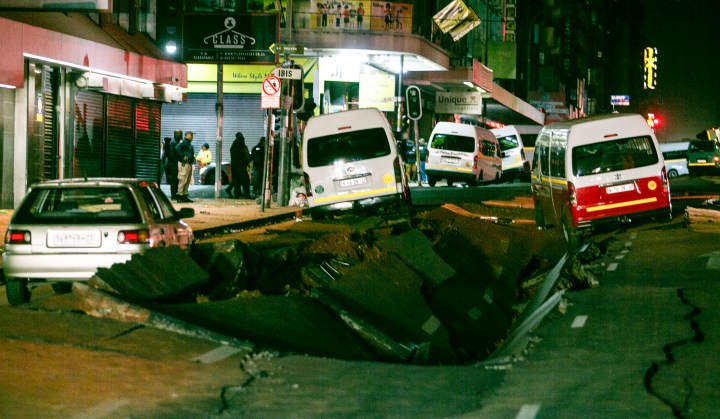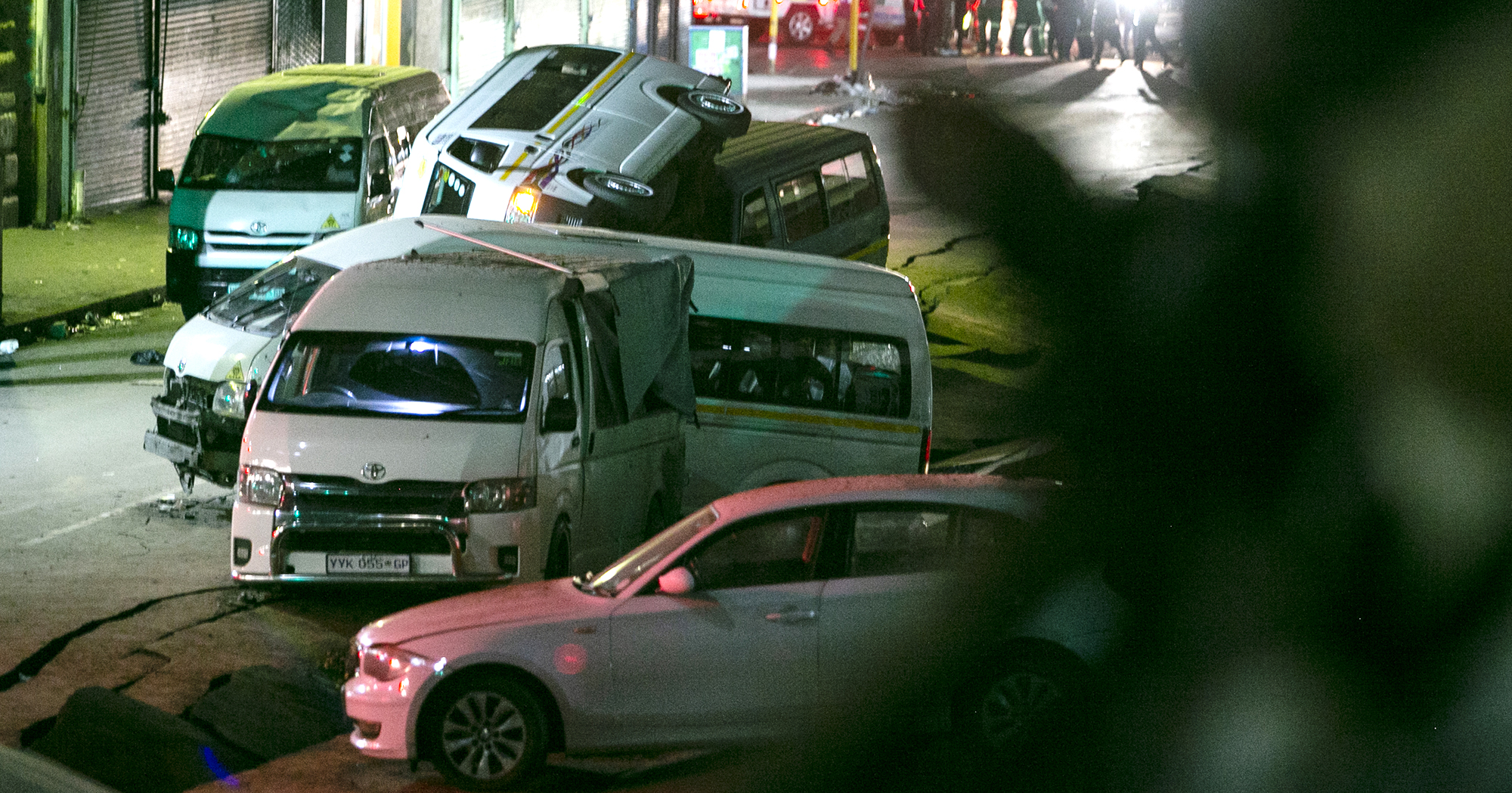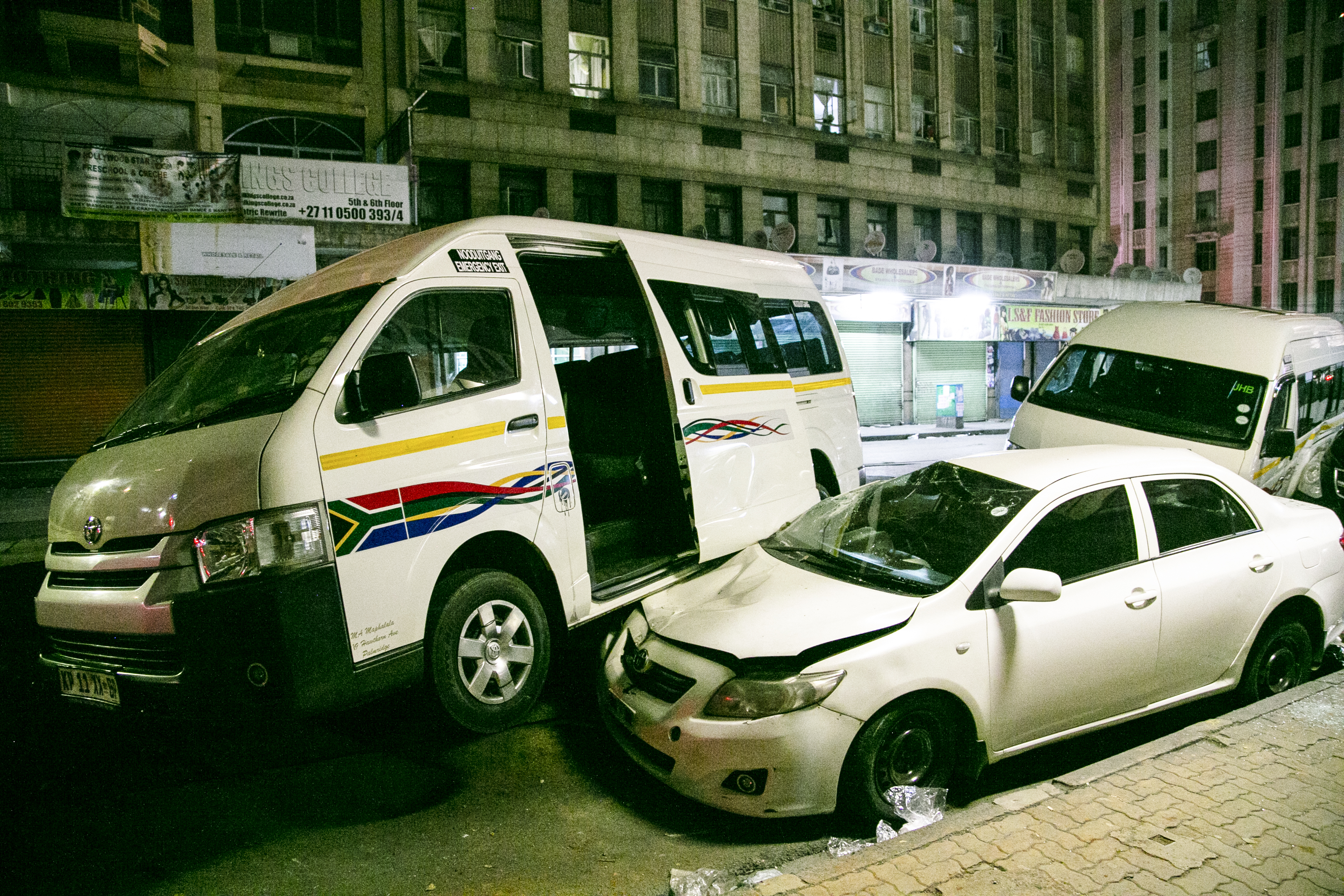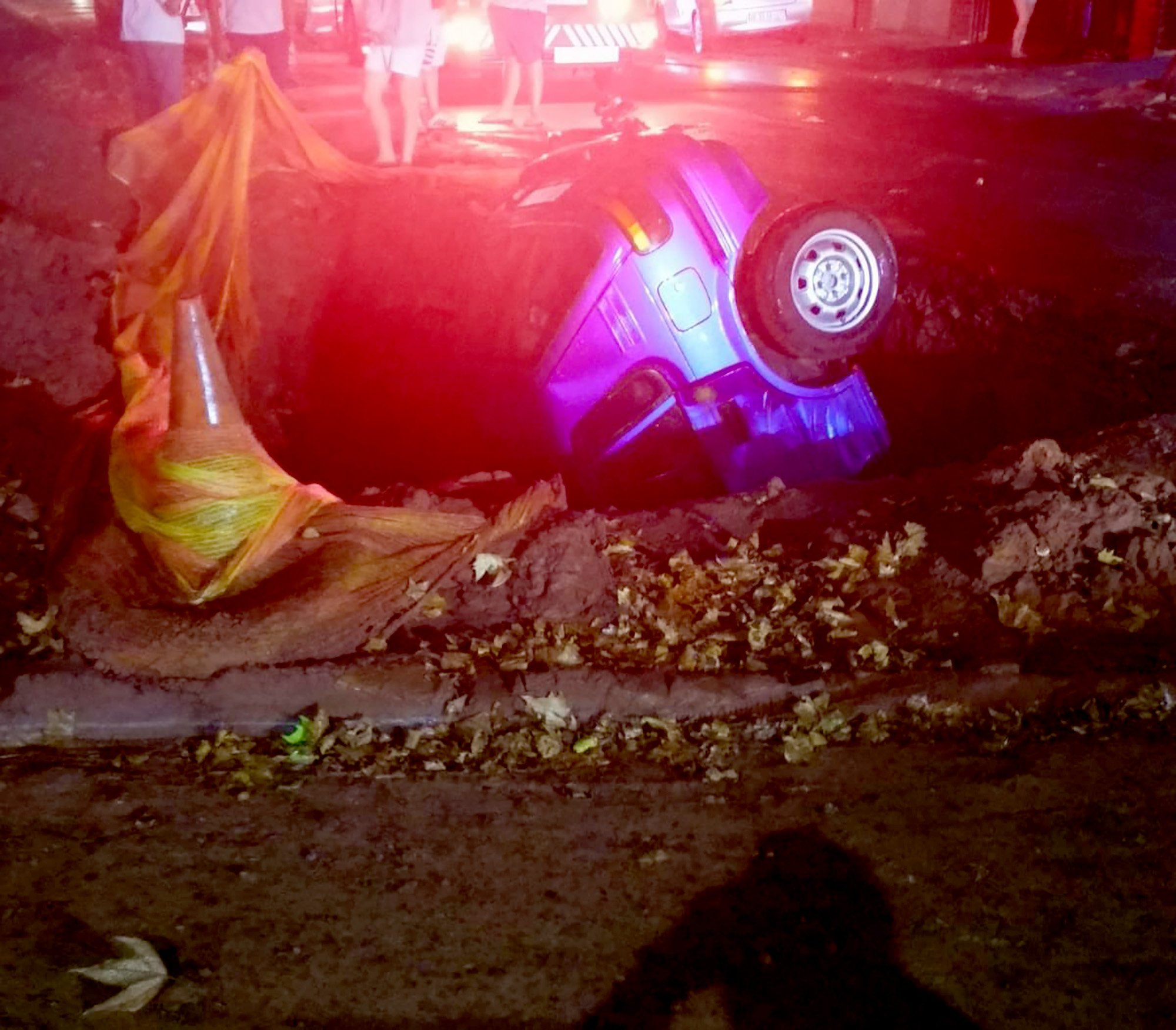POLITICAL ACTION OP-ED
Johannesburg explosion represents our national crisis and the imperative for change

South Africa is physically falling apart virtually before our eyes, and its starkness is only matched by the paralysis of its elites to do anything about it at all.
I do not know what caused the explosion that ripped Johannesburg’s Lillian Ngoyi Street apart last week. At the time of writing the authorities did not know either.
The most watched video of the explosion showed a man who was nearly crushed by a minibus taxi that was tossed into the air and nearly fell on him. Enock Michael, from Malawi, was trying to eke out a living like millions of other people in South Africa. Another Malawian street vendor, Joseph Dumisane, was not so lucky. He was crushed to death by a taxi.
Executive Mayor of Johannesburg Kabelo Gwamanda showed up at the scene, but he was hardly noticeable, especially with limelight predator Panyaza Lesufi also there. Even if Lesufi wasn’t there, Gwamanda has neither the confidence nor sagacity for the job of leading any city, let alone Johannesburg.
While the explosion made international news, it was also one more incident in a gradual collapse that has been years in the making, and progressing almost daily. For the six years to the end of 2021, I worked in the Johannesburg CBD. Going there every day is an extreme sport.
In 2018, one of my then employer’s security guards was shot dead in cold blood next to the main entrance in the early afternoon. I watched him die. He was a kid, born in the 1990s and supposedly “born free”. On that day we had journalists from several African countries in the building, and they came out to board their hired bus just as he was taking his last breath. They were understandably shaken.
Failed governance
There is also the abnormal situation of car insurance companies directing traffic at intersections where traffic lights are almost permanently defective, or fixing potholes, lauded by some as some kind of corporate patriotism. It is not. Normal, functioning cities elsewhere do not need insurance companies to fix potholes and direct traffic.
In any event, homeless people direct Johannesburg traffic these days. Some have dirty, torn reflective jackets, but most wing it. Motorists patiently oblige them because they have accepted that their government is absent from the most basic of its functions.

Several people were injured following an explosion that rocked Johannesburg on Wednesday, 19 July, 2023. (Photo: Felix Dlangamandla)
Lately, even some of Johannesburg’s premier suburbs like Bryanston sometimes go for days without water. There is always some kind of unplanned excavation going on, usually to fix a burst water pipe. I am continuously amazed by how accustomed residents of these dysfunctional but expensive suburbs have become to their situation.
Earlier this year, I visited the home of a businessman, an ANC supporter, in one of Johannesburg’s leafy suburbs. His house is truly impressive, but the street outside his home is not. It is pockmarked with potholes and suffocating from uncut alien plants. He told me he is stuck with the house because he can only sell it for far less than it’s worth, while the value of his Cape Town home has appreciated significantly.
Explosions, water cuts, power cuts, malfunctioning traffic lights manned by homeless people and crime are not the only things besetting Johannesburg, Tshwane, Ekurhuleni, Mangaung or Buffalo City, among others. There is also filth, which lately characterises previously grand boulevards of South African cities.
In Paarl last year, a community activist told us that the local Mbekweni Police Station does not usually record violent crimes. The cops there encourage residents to report the crime at another police station so that it is at least on the system and cannot be “disappeared” by one of the many corrupt cops there. They are on the payroll of a local gangster, who also determines who can and cannot run for town council.
Mbekweni has an informal settlement that defies imagination. It is situated on a riverbed and constantly damp, even outside the rainy season. Illegal electrical connections crisscross the “streets”, posing a permanent danger to children and adults alike. It must be a death trap at this rainy time of the year.
Political collapse
This is just a snapshot of the South Africa in which we live. I get a lot of people who ask “so what is your solution?” when I comment on many of the problems we have. The insinuation is that these problems exist because we have not yet found the perfect technical solution that will make these problems go away.
Technical solutions are really important, but the simple truth is that politics is by far the biggest obstacle to the wellbeing of millions of South Africans. There is no technical solution for a city that cannot keep the same mayor for longer than one year, and when one is there, he is clearly not up to the task.
There is no technical or policy solution to lawlessness where criminal gangs have captured first the politicians and then the police. The right solution is political change, as with it comes new ideas and political will to do the very simple things that are no longer possible.
South Africa is physically falling apart virtually before our eyes, and its starkness is only matched by the paralysis of its elites to do anything about it at all.
Roads, buildings, bridges, and water pipes, among other things, are collapsing. Walking or driving up a street like Russell Road in Gqeberha, or Oxford Street in East London, especially on a Saturday afternoon when there are few cars on the road, lays bare the extreme neglect that causes it all.
There is no magic solution to fixing infrastructure. Solid leadership, proper planning and resource allocation are irreplaceable as the foundations of getting things right. It is about building and maintaining solid public institutions that attract talented people to apply their technical skills for public benefit.

An explosion left destruction in its wake tearing up Bree Street in the Central Business District of Johannesburg, South Africa on 19 July 2023. (Photo: Felix Dlangamandla)
Countries do not collapse and descend into chaos at once. It takes many years, with thousands of daily signs that things are falling apart. In that time, people with the power to prevent that collapse believe “others”, meaning the poor, need the change more. This is even as their wealth, savings and ability to survive without a job are eroded daily.
It is literally possible to tally up the financial and opportunity cost. Over a six-month period, historical and current looting of Eskom cost Shoprite at least R560-million in diesel consumption it should have never needed. Kumba Iron Ore has deferred R2-billion of capital investments because of Transnet’s problems, and load shedding. In the quarter to June this year, Pick n Pay spent R300-million on diesel, putting it on track to spend R1.2-billion over a 12-month period.
Whenever I speak to groups of middle- and upper-class South Africans, many of whom want the change but without investing much or any effort, I am told, “Take your message to the poor people, the villages and townships. You must go there”.
Three requirements for change
Real change will only happen when three things occur at once.
The first is for the middle- and upper-income classes to substitute quiet and social media outrage with political organising so they may have real political power to use. It is not the job of poor South Africans to create change that must, by rights, be inherited by those who do not take the initiative to realise their political hopes and convictions.
Second, as fractured as it is politically, organised business must realise that the cost of political dysfunction will escalate. They all need to mark the price at which it becomes unsustainable and then ask themselves whether the quiet acquiescence was worth the erosion of value. Will it be when it costs a Shoprite or Pick n Pay R4-billion per year each to pay for infrastructure shortages their taxes are supposed to have paid for already? Will it be a riot against either of them when they are forced to retrench poor workers?

A sinkhole on Long Street in Albertville, Johannesburg which had not been fixed despite desperate pleas from residents for months on end. 8 March 2022. (Photo: Twitter / @SajedaMansoor)
Finally, there is no possibility for change if the tens of millions of South Africans who have lost faith in the political system do not return to the ballot. In a democracy, only democratic participation drives sustainable change, otherwise the substitute is violence.
Political organising for change through democratic action, or support thereof, are the only ways South Africa will get out of the hole that inaction is digging. However, I am not always so hopeful. The conditions under which millions of people live are simply intolerable, and their patience to suffer through the dysfunction and corruption will not last as long as the elite’s tolerance for erosion of their wealth and comfort.
Our collective duty is to create a moment in which people in different income strata appreciate the commonality of their interests in this time of crisis. Next year’s elections present the very last opportunity for those who want change to move beyond words and into action, and fight for the future their children deserve.
In this respect, silence or mere words are not enough. People need to help at least 10 other people to register and encourage them to vote next year. They also need to pick a political cause. Sitting on the fence has become immoral and complicit. DM
Songezo Zibi is the National Leader of RISE Mzansi.

















“Sitting on the fence has become immoral and complicit.” – It’s what Madiba & Tuttu said and stands more than ever today when clearly the liberator has become the oppressor. RISE Manzi – please don’t lose hope, you are a light in our very dark SA.
Keep on shining Rise Mzansi!
Good article, but I am waiting for the part where you denounce the ANC and suggest an alternative party to vote for? Until people like Mr Zibi clearly endorse a political party to bring analytic needed change the status quo will remain.
Upper middle classes “organising politically” will do nothing they already vote for not the ANC, unless they became upper and middle class via the ANC.
It’s also trendy to decry the current system, but unfortunately it is the only one we have. Come on Mr Zibi, do the right thing and endorse the DA or the moonshine pact!
Rise Mzanzi is its own political organisation. If the moonshot pact serves the needs of SA it will be supported.
Rise Mzanzi is a political organisation, but it has no capability or seeming intention to govern.
The article is a call to action but is also a huge exercise in fence-sitting. He bemoans the lack of action by the upper and middle classes but does not do anything himself. Much rhetoric, and minimal tangible outputs – same as Cyril.
I suggest you find out more about the activities of Rise Mzansi before accusing them of fence-sitting.
100% agree with you, it’s time to denounce the ANC and have the courage to suggest voting for the DA. At its absolute worst it could not possibly be worse than the current situation.
As long as people are hired by colour and not merit through forced BBBEE policies, we will continue to see a blase entitled view of jobs – there are government departments where the staff don’t even come to work – but they are still paid. People are given equity for no effort – why should they work? This is what is killing this country. When they have stolen and destroyed everything, the ANC holds out the begging bowl and asks for more money and plays the race card. The emperor wears no clothes.
As long as the ANC and other similar criminals stand to gain from the chaos, then why would it get better. SA is crumbling whilst the pigs eat!
The answer to your question is right there, in your own article. The ANC-supporting businessman, who seems to have used his ANC connections to make enough money to afford a second home in Cape Town, where property prices are rising while they are collapsing everywhere else….. there is a clear irony there, but also a solution. If you want to live in a city that is run like Cape Town, vote for the people who are in charge in Cape Town. It’s as easy as that.
Yes – but the reason people are lacklustre about registering to vote is because they have no-one to vote for. The people who are not registering are surely ex ANC supporters and are now not registering because they see no other option. The DA is out for them. So that leaves who exactly? We need someone like you to tell them, to stand up and endorse a party. That doesn’t seem to happen in this country. It happens overseas but I don’t see it happening here. Why? You have a voice. Get behind a party that is going to make a difference and use your platform to put your money where your mouth is.
Sometimes I really don’t understand the comments on Daily Maverick op-ed pieces. The writer of this article is Songezo Zibi – the national leader of RISE Mzansi, yet there are ridiculous statements such as “do the right thing and endorse the DA”. WTF? The same person goes on to say “Rise Mzanzi is a political organisation, but it has no capability or seeming intention to govern.”
Does founding a political organisation with the aim of contesting next year’s elections and writing articles such as this one not appear to be intending to govern?
Another person says “Get behind a party that is going to make a difference and use your platform to put your money where your mouth is.” Somehow, for a lot of readers, it was possible to work out that Songezo Zibi is doing exactly that.
I would rather vote for Songezo Zibi than vote for Helen Zille or John Steenhuizen or Cyril Ramaphosa – and I believe that RISE Mzansi may be a serious threat to the ANC and the DA in next year’s elections.
Rise Mzansi is a political organisation and not a political party. From their website this sums up their mission statement best – “We are here to organise South Africans to come together and collectively drive us to RISE as a nation.” – so yes no intention to govern, rather an intention to lead. They seem to have an idea to register as independents in next year’s election but there is not the structure, capability, or desire to actually do the nuts and bolts of governing. Their website has nothing tangible, no policy, this article has nothing tangible, no policy, just broad attacks on the status quo, lumping all political parties together.
I must apologise to you as well as the other commenter that I dismissed – tripped up by my own ignorance. Believe it or not, I thought that political organization equated to political party. Clearly they are two different things, so your comments are valid.
Nevertheless I would prefer Songezo Zibi to move his organization into the political sphere of contesting elections in the name of RISE Mzansi than endorse the DA or any other party for that matter. The RISE Mzansi web site urges people to get involved; I will get involved with RISE Mzansi and see what can be done from the inside. With some luck, they may educate me. 🙂
The moonshine pact com of course agree that their presidential candidate is Zibi. Presumably he would accept it.
There is also a lack of clarity surrounding independents standing in the national election.
Thank you for your sane comment. Clearly people who have commented have not been following Songezo Zibi or Rise Msanzi.
Thank you Clyde – I support Rise Mzansi too. They are not into “opposition” politics as other parties are, but present alternate solutions in a constructive manner.
Follow RISE Mzansi on Facebook, Twitter, Instagram and visit its website to gain insight into the extraordinary work they are doing on the ground to mobilise local civil society into action, through acts of service, and to provide a real alternative to the ANC at next year’s elections.
Heed Songezo Zibi’s call to persuade (and assist) 10 people, who would otherwise have stayed away from the polling station, to register and vote in 2024.
I’m one of those who didn’t vote last time but will definitely be at the polling station in 2024 to vote for a movement I can at least believe in. I’ll encourage others too.